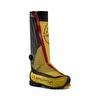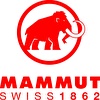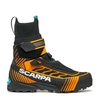Countdown to the ISMF World Ski Mountaineering Cup

 1 / 81
1 / 81 International Ski Mountaineering Federation
International Ski Mountaineering Federation
A World Cup in five stages, with the world’s best athletes racing to score precious points to achieve the crystal cup. Andorra, Italy and Switzerland are the countries that will host the five stages of the World Cup, from January to March. The five stages of the World Cup, Andorra 15-16 January, Albosaggia (Italy) 30-31 January, Les Marécottes (Switzerland) 5-7 February, Alpago (Italy) 19-20 February and Prato Nevoso (Italy) 18-20 March, will include five Individual Races, three Vertical Races and four Sprint Race.
Each stage of the World Cup will host 13/15 countries where the "Alpine" countries, such as France, Italy, Switzerland, Germany and Austria, that have a deeply rooted tradition in "sealskin", earn more gold medals. Not to mention the huge efforts made by the youth teams of Spain, Andorra, Norway and Sweden. Athletes from Canada, USA, Korea and Japan will also take part in some stages of the World Cup and in the winners’ championships.
Last season’s winners have joined in for 2016 as well, so champions such as the Italian Damiano Lenzi, winner of the Overall World Cup, and the French Laetitia Roux, who practically never left the podium in 2015, will be at the starting line in Andorra too.
Other athletes include the French William Bon Mardion (winner of the Individual World Cup), the Italian Robert Antonioli (winner of the Sprint World Cup), the Spanish Kilian Jornet Burgada (winner of the Vertical World Cup), who, after a summer spent touring the mountains all over the world as a climber and a sky-runner, now wants to win the Individual World Cup that he lost by a hair’s breadth last year. Outsiders include the German Josef Rottmoser, a Sprint Race specialist, and the young Anton Palzer, the Italian Matteo Eydallin and Michele Boscacci, and the French Xavier Gachet.
On the women’s side, the magic Laetitia Roux will have to defend herself from the attacks of her teammate, Axelle Mollaret, the Swiss Jennifer Fiechter, the Swedish Emelie Forsberg, the Spanish Marta Riba Carlos and the Swiss Victoria Kreuzer.
DISCIPLINES
Individual Race
This takes elements from the team race, but is based on the single individual athlete. Again there will be at least 3 ascents and descents. As with the team event there will also be a section on foot with the skis carried on the rucksack, although some ISMF events no longer use harness and cord, they still might have to use crampons for steeper, icier ascents. Races normally last from one and a half to two hours and cover a total hight gain of up to 1900m. As with the team events the race start is a mass start of all the athletes.
Vertical Race
As the tile suggests the vertical race is an uphill only event. It is usually carried out on well packed snow with the whole race taking place with skins under the skis in a single, long ascent. It is a race to the top, and should not exceed a height gain of more than 700m.
Sprint Race
This is a mini Individual race, combining the essential ski mountaineering features and techniques with an ascent on skins, part of the ascent on foot with skis on the rucksack and then from the top a single descent. As the title implies this is a very fast race, and is based on completing the total course in approximately 3 minutes for the fastest racers. The total ascent and descent is about 100m, with athletes starting and finishing in almost the same point. The first round is an individual qualification with athletes starting one after the other every 20 seconds, after the qualifying round athletes face each other in heats of 6. Although the ascent is usually on well packed snow , the descent is supposed to be fun and can be off-piste, with gates and with small jumps.
For further information visit www.ismfskievents.com
| Expo.Planetmountain | |
| S.C.A.R.P.A. | |
| www | |
| www.ismfskievents.com | |



 Copia link
Copia link


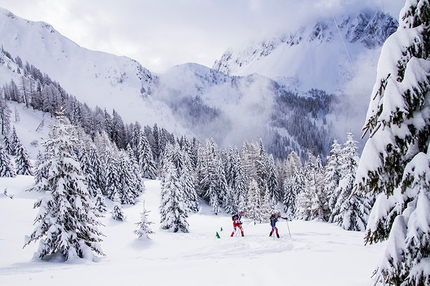
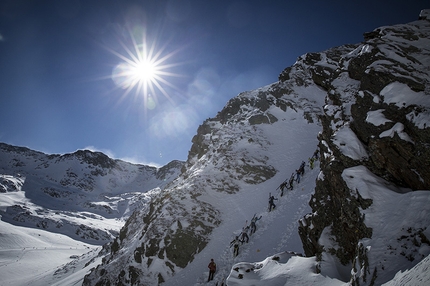














 See all photos
See all photos










